8 Best Supplements for Hair Growth, Doctors Say
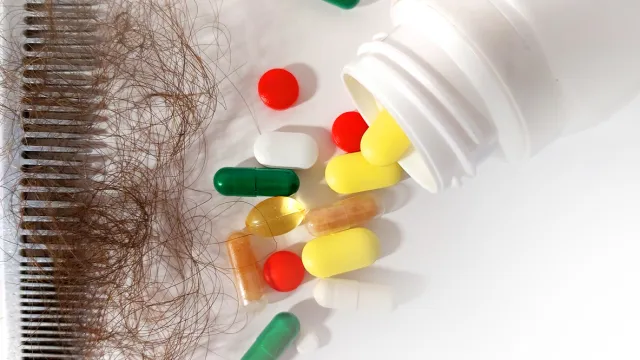
For so many of us, our hair is tied to our emotions. It’s why people often chop it off after a breakup or go for va-va-voom volume to feel sexy. So when our locks feel lackluster, it can take a toll on our wellbeing. Whether you’re dealing with limp strands, sudden thinning, or hair that just won’t seem to grow, you may be trying out the latest shampoos and serums. But doctors say luscious locks may start from within, and they’re recommending the best supplements for hair growth. Read on to learn the natural remedies that can put a bounce in your ‘do.
RELATED: 9 Surprising Things That Can Cause Hair Loss, Experts Say.
1
Iron
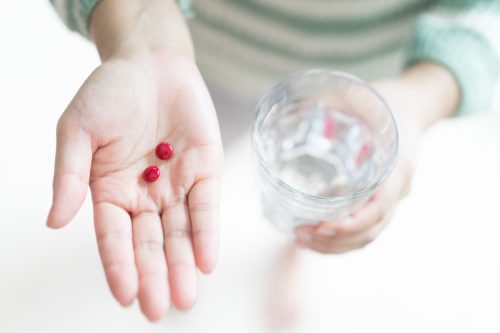
Iron helps boost circulation and move oxygen to the body’s cells more efficiently. When you have a deficiency, the health of those cells, including the ones that stimulate hair growth (as well as nail growth), suffers.
A simple blood test can tell you if you have an iron deficiency. Dermatologist Melissa Piliang, MD, told Cleveland Clinic that this is especially common among women.
To get iron through your diet, Piliang recommends eating “two 4-ounce portions of red meat per week.” Other sources of iron include dark leafy greens and beans. If this doesn’t boost your levels, you can speak with your doctor about taking an iron supplement.
2
Collagen
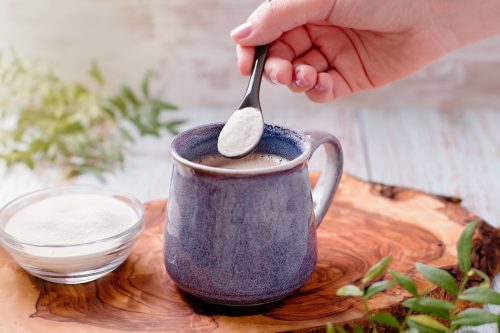
Danielle Kelvas, MD, primary care physician at The HCG Institute and chief medical editor at DKMD Consulting, shared with Best Life that she was once losing her hair in clumps due to stress—and that what helped it regrow was incorporating collagen powder into her diet.
“Collagen is the backbone protein that makes up hair, skin, nails, and much of our bones,” she explains. “Collagen can be sourced from cows, fish, egg shells, and pigs. If someone has a shellfish allergy, I would avoid fish-derived collagen. Bovine-sourced collagen types 1,2,3,4 are the best.”
This may be an especially important supplement if you’re noticing thinning hair as you get older since the body naturally produces less collagen as we age, according to the Cleveland Clinic. Lack of collagen can also lead to wrinkles and dull skin.
3
Vitamin C
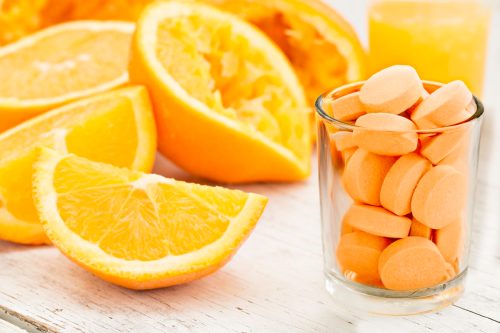
The benefits of vitamin C for hair growth are twofold. First, this nutrient helps your body absorb iron.
It also “works within your body to produce collagen, which is required to support the growth of new strands as well as the health of existing hair growth,” says Don Grant, MD, clinical lead at online pharmacy The Independent Pharmacy.
Your risk of vitamin C deficiency also increases as you age. Vitamin C-rich foods include citrus, cruciferous vegetables, and bell peppers; you can also speak with your healthcare provider about supplements.
RELATED: 12 Supplements You Should Never Take Together, Medical Experts Say.
4
Biotin
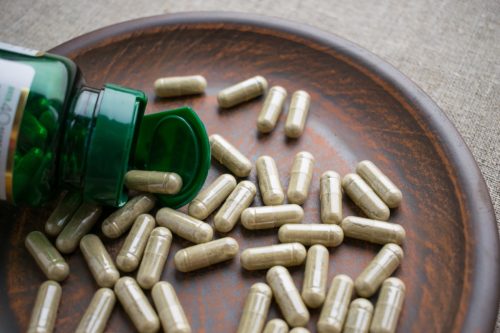
Perhaps no supplement is more associated with hair growth than biotin, or vitamin B7. Biotin helps the body metabolize fats, carbs, and proteins, and a deficiency can lead to hair loss.
However, it’s unlikely that a Biotin supplement will help with hair growth if you aren’t deficient in it. According to a 2017 study published in the journal Skin Appendage Disorders, “there is limited research to support the utility of biotin in healthy individuals.”
Your doctor can help you determine if you have low Biotin levels and require a supplement. And you can “get this nutrient from whole grains, almonds, and meat products,” says Anna Chacon, MD, dermatologist and writer at MyPsoriasisTeam.
In addition, there are plenty of shampoos made with biotin, and they can help with hair follicle regeneration.
5
Vitamin B12
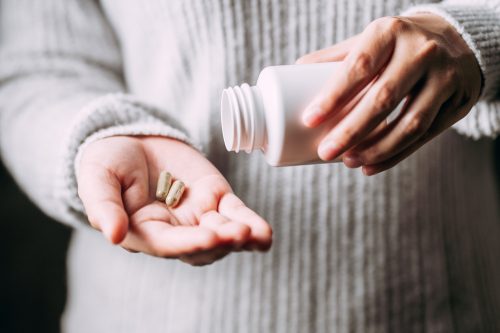
Your body does not naturally produce vitamin B12, but most people get enough of the nutrient through poultry, meat, fish, dairy, and fortified breakfast cereals, according to the Mayo Clinic.
However, plant-based foods do not contain the vitamin, so those who follow a vegetarian or vegan diet may not get adequate amounts. “Older adults and people with digestive tract conditions that affect absorption of nutrients also are susceptible to vitamin B-12 deficiency,” the Mayo Clinic states. In these cases, a deficiency can affect hair growth.
“Vitamin B12 supplements help to produce oxygen-rich red blood cells, which transport oxygen to your hair follicles,” explains Grant. “It is a biological process that promotes hair growth by producing new hair cells.”
6
Vitamin D
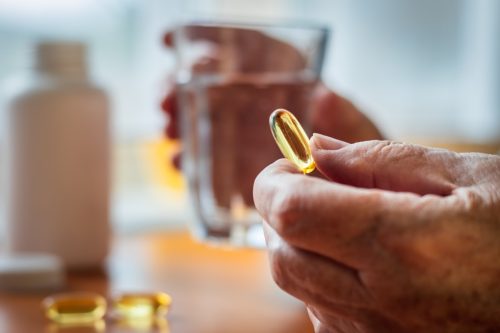
According to Michael May, MD, medical director at Wimpole Clinic, vitamin D is essential in cell regulation and the immune system; if you have a deficiency, it could result in hair loss.
The easiest way to increase your vitamin D consumption is through sunlight exposure (with SPF, of course). “Oily fish, red meat, and egg yolks are also high in vitamin D,” says May. “Those who follow a vegan or vegetarian diet should learn to appreciate mushrooms, which are one of the only plant-based sources of vitamin D.”
If diet alone doesn’t up your vitamin D levels, a supplement can help with hair growth. It’s also believed that the nutrient can prevent hair from turning prematurely gray.
RELATED: The 5 Best Styles for Thinning Hair, Experts Say.
7
Lysine
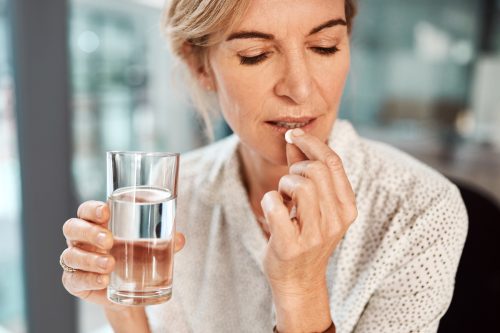
Naturopathic doctor Janine Bowring, ND, recently took to her TikTok account to share supplements that promote hair growth, including Lysine, or L-lysine.
According to Mount Sinai, it “is an essential amino acid, meaning it is necessary for human health, but the body cannot make it. You have to get lysine from food or supplements. Amino acids like lysine are the building blocks of protein.”
Among its functions, lysine “plays an important role in the formation of collagen,” they explain. Therefore, if you don’t get enough lysine in your diet, it could result in hair loss.
Lysine is found in red meat, pork, poultry, eggs, soybeans, and fish such as cod and sardines. In addition to potentially aiding hair growth, lysine “also helps with beautiful skin and to decrease your wrinkles,” notes Bowring.
8
Nutrafol
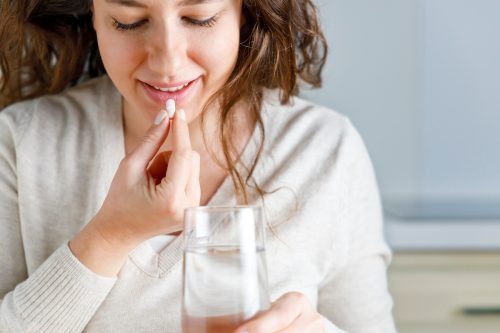
Nutrafol is the brand name for a popular hair growth supplement. The ingredients are many and include a proprietary type of ashwagandha, saw palmetto, curcumin (the active ingredient in turmeric), and marine collagen peptides. The supplements also contain biotin, vitamin D, vitamin C, and L-lysine, among other vitamins. There are specially designed supplements depending on your age, gender, and the root cause of your hair loss.
But Nutrafol isn’t just a popular product. Research from 2022 published in The Journal of Clinical and Aesthetic Dermatology found that the supplement provided “significant improvements” to the study subjects’ “hair growth, coverage, density, and volume.” Participants included 47 men aged 20 to 55 and 51 premenopausal women aged 20 to 45 years, all with “self-perceived, mild-to-moderate hair thinning.”
A separate 2022 study published in the Journal of Drugs in Dermatology concluded that Nutrafol also showed positive hair growth effects for menopausal and postmenopausal women.
Best Life offers the most up-to-date information from top experts, new research, and health agencies, but our content is not meant to be a substitute for professional guidance. When it comes to the medication you’re taking or any other health questions you have, always consult your healthcare provider directly.
- Source: Cleveland Clinic: Does Iron Deficiency Cause Hair Loss?
- Source: Cleveland Clinic: Collagen
- Source: Skin Appendage Disorders: A Review of the Use of Biotin for Hair Loss
- Source: Mayo Clinic: Vitamin B-12
- Source: Mount Sinai: Lysine
- Source: The Journal of Clinical and Aesthetic Dermatology: A Prospective Six-month Single-blind Study Evaluating Changes in Hair Growth and Quality Using a Nutraceutical Supplement in Men and Women of Diverse Ethnicities
- Source: Journal of Drugs in Dermatology: A Long-Term Study of the Safety and Efficacy of a Nutraceutical Supplement for Promoting Hair Growth in Perimenopausal, Menopausal, and Postmenopausal Women